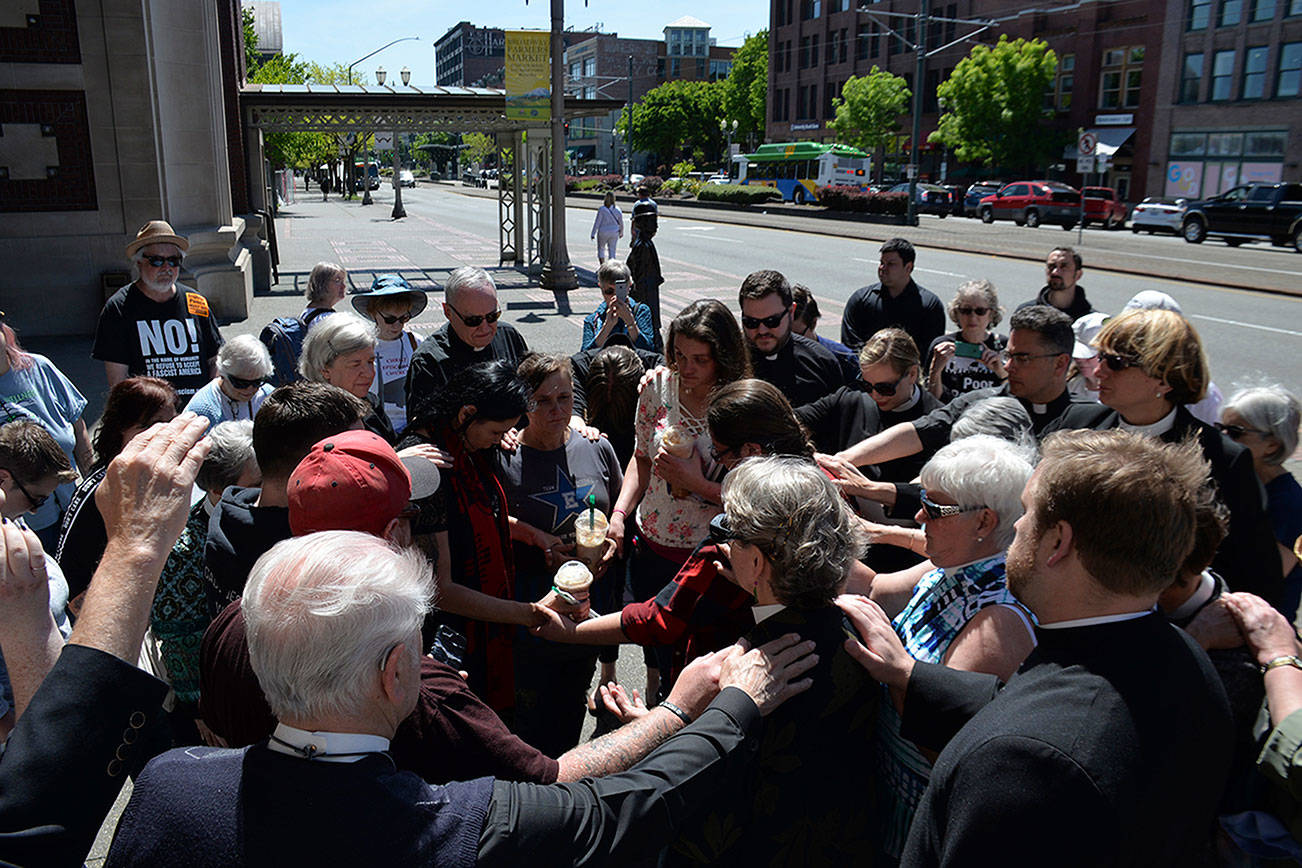A federal judge in Tacoma granted a 30-day stay, or hold, on the City of Aberdeen’s plan to clear people from the city’s riverfront homeless camp, which otherwise might have happened as soon as Saturday.
A coalition of people who live at the camp and two activists who have worked with them have sued the city to stop the evictions.
During a hearing Tuesday, Judge Ronald B. Leighton asked that the two parties negotiate a solution and come up with a plan for where the homeless individuals will go if they are not allowed to live at the camp along the Chehalis River. Leighton did not approve or deny the plaintiffs’ request for an injunction to stop the evictions temporarily, but he warned there would be consequences if the city moved to evict people before the 30-day stay was up.
“Mark my words though, if there’s any change, any roust, there will be hell to pay,” Leighton said to the city’s side of the courtroom. “Get your negotiators, and solve this problem.”
Along with imposing a 30-day stay, Leighton called on city officials to do more to solve the city’s riverfront homelessness issue.
“You guys have to get an oar, and put your oar in the water, to start contributing to solving this problem,” said Leighton.
He added that this case was “one of two or three cases” in 18 years he’s seen that “cries out for good faith, and good will between neighbors.”
The courtroom was packed with more than 30 people, including more than a dozen Episcopal priests from Seattle, Olympia and elsewhere to support the Rev. Sarah Monroe, one of the plaintiffs who filed the lawsuit, as well as multiple homeless advocates. Some in attendance gave high fives to each other on the way out of the courtroom.
The hearing was part of a lawsuit against the city, filed by 10 plaintiffs who include eight homeless people living at the riverfront camp, as well as Apryl Obi Boling and Monroe, an Episcopal priest who works to assist homeless as part of her group Chaplains on the Harbor. The lawsuit aims to stop the city from evicting people from the riverfront until alternate shelter is provided for those living there, and claims several of the city’s codes are unconstitutional for how they restrict homeless camping in public.
Mayor Erik Larson proposed the ordinance to remove all public access to the camp, which would result in the city clearing it. The camp is on a thin piece of property between the river and railroad tracks. The city purchased it last year for $295,000. The ordinance asks that the camps be cleared due to the “life safety, public safety and public welfare” concerns of having people living down by the riverfront. The ordinance was set to be finalized by the Aberdeen City Council Wednesday night in its third reading.
Leighton said he initially intended to deny the injunction and allow the evictions, but after hearing from the plaintiffs’ lawyer Jim Lobsenz, he instead asked the parties to come to another solution and find somewhere else for the homeless people to go. Lobsenz argued that the goal of clearing the camps wasn’t to improve public safety, but to force them out of Aberdeen.
“To have that garbage and feces in the downtown sidewalks of Aberdeen is not going to make it better,” said Lobsenz.
When Leighton asked Aberdeen City Attorney Patrice Kent what kinds of public spaces there are where the riverfront people are allowed to live, she said there are “a few park locations, and another currently undeveloped (property) in a slightly better location” as examples of public spaces that are less unsafe than the riverfront property where they currently reside.
Lobsenz said he believes the two sides can come to an agreement, but said he’s doubtful the city council would be in favor of a solution such as ordering half of the campers to one city park and the rest to another.
“Name these places. Where are they? If they know of some parks, it could be 48 hours, and we could arrange to ferry everybody’s property, and it might take a week or 10 days, to some other parks,” said Lobsenz. “I suspect the city council would not like this, and suddenly reverse its tracks.”
It’s unclear what will happen at Wednesday night’s Aberdeen City Council meeting, where Kent said she intends to discuss the lawsuit’s implications on the ordinance with them. Larson said in a phone interview he’s not sure whether the council will approve the ordinance or not, and added he won’t enforce anything in violation of federal court orders.
“It’s in the council’s hands, and we’ll work to implement it in a way that respects the process in the federal courts and is best for the city,” said Larson.
Kent, as well as city council member Karen Rowe and council president Tawni Andrews declined to comment on their way out of the court house.
Monroe said after the hearing that the result was a positive step toward working on a solution to address homelessness in the city, and she hopes that eventually a new shelter is built.
“I think the pressure to negotiate and actually come up with a solution is a great move, a positive move in the right direction,” said Monroe.




